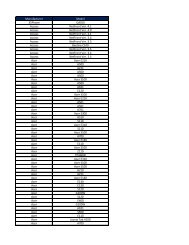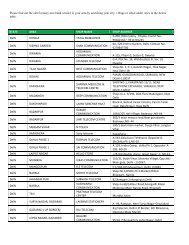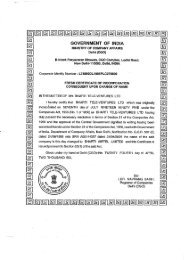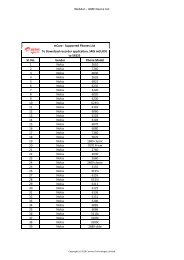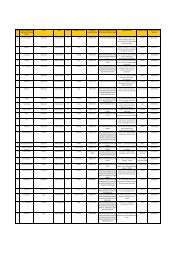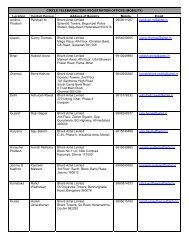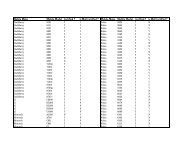You also want an ePaper? Increase the reach of your titles
YUMPU automatically turns print PDFs into web optimized ePapers that Google loves.
operations beyond the said region and will be based at<br />
Nairobi, Africa under the leadership of CEO (International) &<br />
Joint Managing Director.<br />
CEO (India & South Asia) is responsible for leading India and<br />
South Asia businesses and driving growth in this region.<br />
The organisation is headed by the Chairman and Managing<br />
Director. The CEO (International) & Joint Managing Director<br />
and the CEO (India & South Asia) administratively report to<br />
the Group Chairman and Managing Director. There is a clear<br />
demarcation of duties and responsibilities amongst the three<br />
positions.<br />
• The Chairman and Managing Director is responsible for<br />
providing strategic direction, leadership and governance<br />
in addition to leading transformational initiatives and<br />
strategic international alliances and effective<br />
management of the Company;<br />
• The CEO (International) & Joint Managing Director is<br />
responsible for overall business performance,<br />
management and expansion of the international<br />
operations. He is also responsible for employee<br />
engagement, customer satisfaction, outsourcing<br />
initiatives and the internal control metrics for<br />
international operations;<br />
• The CEO (India & South Asia) is responsible for the overall<br />
business performance, management and expansion of<br />
the Company’s operations in India and South Asia. He is<br />
also responsible for driving the growth and business<br />
synergies in Mobile Services, Telemedia Services,<br />
Enterprise Services and DTH in the region.<br />
Company’s India and South Asia business is structured into<br />
three Strategic Business Units (SBUs) namely Mobile Services,<br />
Telemedia Services, and Enterprise Services. Each of the SBUs<br />
is headed by a business president / joint president under the<br />
leadership of CEO (India & South Asia).<br />
The corporate governance structure of the Company is multitiered,<br />
comprising of governing boards at various levels, each<br />
of which is interlinked in the following manner:<br />
(a) Strategic supervision and direction is provided by the<br />
Board of directors, which exercises independent<br />
judgment in overseeing management performance on<br />
behalf of the shareowners and other stakeholders. The<br />
Board plays a vital role in the overall management of the<br />
Company;<br />
(b) Control and implementation is exercised by the <strong>Airtel</strong><br />
Management Board (AMB). The CEO (India & South Asia),<br />
the presidents/ joint presidents of the three SBUs and the<br />
functional directors are members of the <strong>Airtel</strong><br />
Management Board. The AMB meets on a monthly basis<br />
and takes decisions relating to the One<strong>Airtel</strong> business<br />
strategy and looks at achieving operational synergies<br />
across business units. The team owns and drives<br />
company-wide processes, systems and policies. The AMB<br />
also functions as a role model for leadership development<br />
and as a catalyst for imbibing customer-centricity and<br />
meritocracy in the culture of the Company;<br />
(c) Operations management is led by the Management<br />
Boards of the three SBUs. Management Boards are<br />
assisted by their respective Hub or Circle Executive<br />
Committees (ECs) for day-to-day management and<br />
decision making with sharp focus on enhancing the<br />
efficiency and effectiveness of the respective businesses;<br />
(d) Technology management is provided by the <strong>Airtel</strong><br />
Technology Council, which concentrates on assessing<br />
emerging technological trends and achieving consensus<br />
on future technology initiatives and action plans.<br />
Company’s governance structure helps in clearly determining<br />
the responsibilities and entrusted powers of each of the<br />
business entities and thus enables them to perform those<br />
responsibilities in the most effective manner. It also allows the<br />
Company to maintain its focus on the organisational DNA<br />
and current and future business strategies. It also enables in<br />
effective delegation of authority and empowerment at all<br />
levels.<br />
After acquisition of Zain, the Company is working towards<br />
the integration of the entire business of India, South Asia and<br />
Africa and will re-design the organisational structure, which<br />
is more suitable to the changed business environment.<br />
Independent Directors<br />
Company’s Board has adopted a comprehensive policy on<br />
independent directors that sets out the criteria of<br />
independence, age limits, recommended tenure,<br />
membership of committees, remuneration and other related<br />
terms. The policy emphasises the importance of<br />
independence and states that an independent director shall<br />
not have any kind of relationship with the Company that<br />
could influence such directors’ position as an independent<br />
director. As per the policy:<br />
a) The independent director must meet the baseline<br />
definition and criteria on “independence” as set out in<br />
clause 49 of the listing agreement and other regulations,<br />
as amended from time to time;<br />
b) The independent director must not be disqualified from<br />
being appointed as director in terms of section 274 and<br />
other applicable provisions of the Companies Act, 1956;<br />
c) The minimum age for appointment is 25 years and the<br />
maximum is 70 years;<br />
d) The independent directors to be appointed on at least one<br />
committee but not more than two committees of the<br />
Board;<br />
e) It is recommended as a general principle that the<br />
independent director should not be a director on board of<br />
more than six public listed companies;<br />
f) Subject to re-appointment at annual general meeting,<br />
tenure for independent directors is three terms of three<br />
years each. For incumbents who are in their third term, the<br />
term will be until completion in the normal course or three<br />
years from January 1, 2008, whichever is later;





